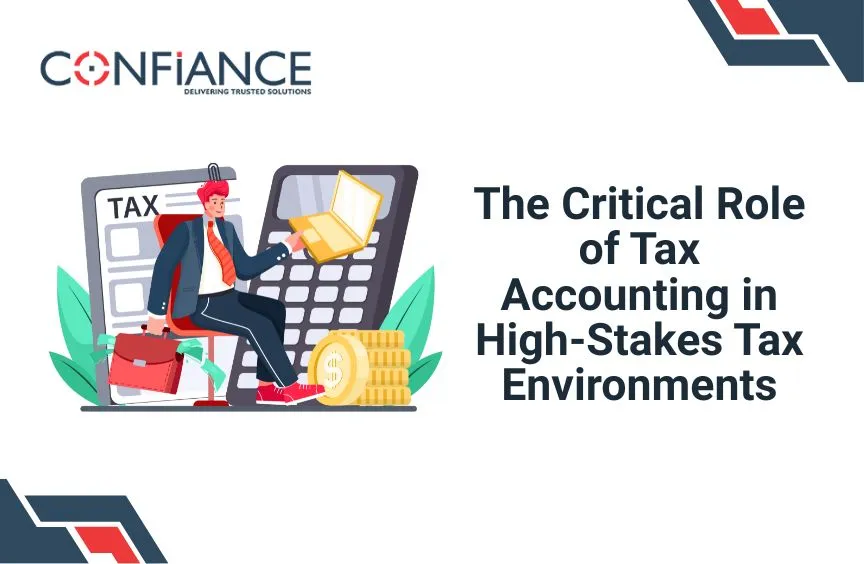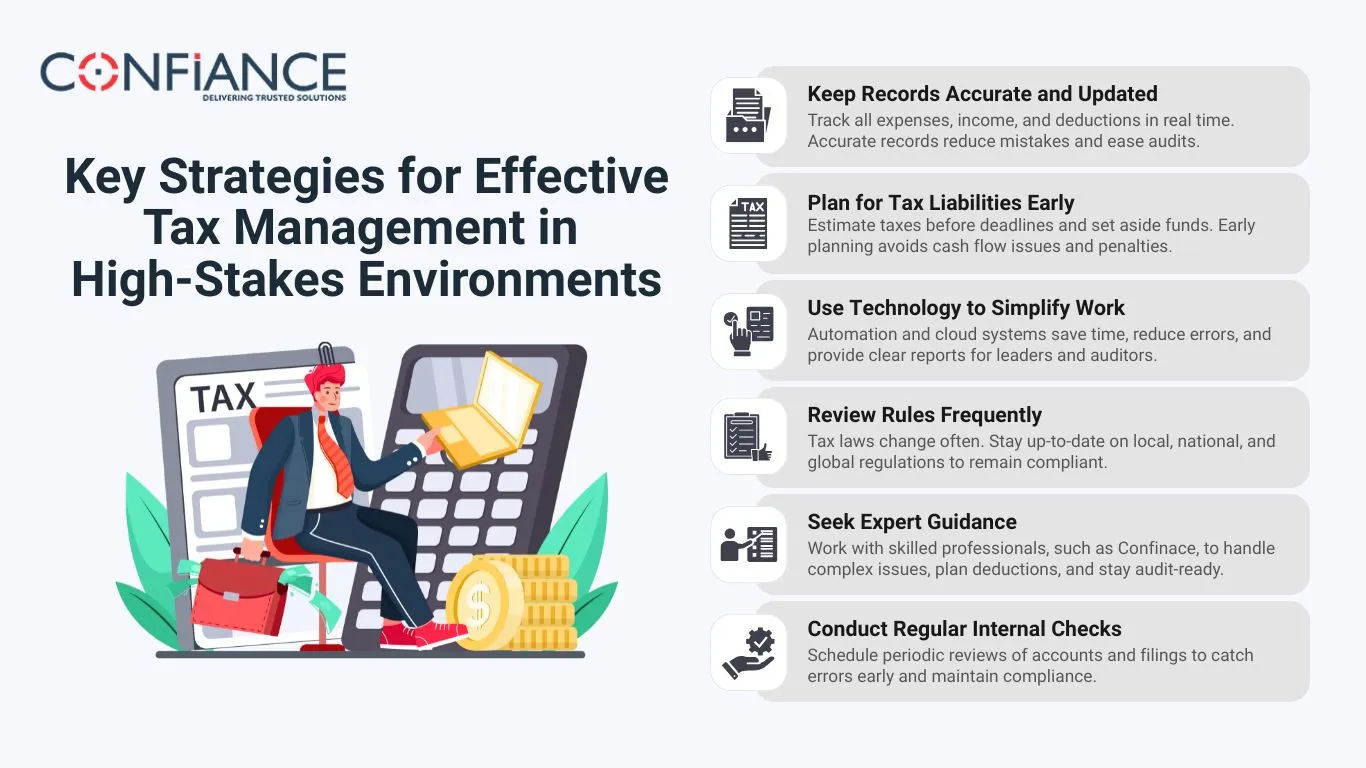
The Critical Role of Tax Accounting in High-Stakes Tax Environments
Tax management is not only about filing returns. It is about keeping records clear, paying the right tax, and staying safe in high-risk tax settings. As tax rules change and compliance pressure rises, firms need strong tax accounting systems to stay compliant. Without good planning, the chance of audits, fines, or loss of trust is high. In this blog, we will explore why tax accounting is vital, how it helps in tough tax spaces, and how it supports growth.
What Is Tax Accounting and Why Does It Matter?
Before we understand why tax accounting is important, we need to know what it is.
Simple Meaning of Tax Accounting
Tax accounting is the way of recording and reporting money based on tax rules. Unlike normal accounting, which looks at the overall health of a business, it focuses on laws and codes. It makes sure that the right tax is paid on time while also finding fair ways to cut the tax bill.
Why All Firms Need It
Every person or firm has tax duties. It is not only about paying money to the state. It helps plan and track costs, finds credits, and lowers risk in a safe way. A firm without this may face cash flow issues, audits, or even loss of name.
It Is Important because:
- Plan Better: It helps firms plan budgets and use money wisely.
- Save Money: It finds credits and deductions that reduce costs.
- Stay Safe: It lowers the risk of audits and legal trouble.
- Build Trust: Clear tax records improve a firm’s name with clients and investors.
The Pressures of Modern Tax Rules
The tax world today is fast-moving and complex. Global growth, new rules, and digital checks make tax work harder than ever.
Fast-Changing Rules
Tax rules are not fixed. They change often, sometimes each year. Firms must keep track of new laws, new filing needs, and new codes. It helps firms adjust plans so they do not fall behind.
Global Business and Cross-Border Tax
As more firms go global, tax gets harder. Each country has its own tax laws. Failing to follow them can cause double tax or big fines. It makes sure income across borders is tracked and taxed in a fair way.
The High Price of Mistakes
In high-stakes tax settings, a single slip can cost much. Missing a due date, filing wrong data, or claiming the wrong cut can all trigger audits or fines. With proper tax management, firms lower these risks and stay in line with the rules.
How Tax Accounting Builds Strategy
It is not just about avoiding risk. It is also a smart tool for growth.
Planning and Forecasting
Good tax planning gives a clear view of how today’s choices affect future tax bills. Buying assets, hiring staff, or moving to new markets all change tax needs. A tax plan saves money and avoids shocks.
Growth and Expansion
When taxes are well managed, more money stays in the business. That money can go into new markets, staff, or tech. Strong tax systems allow leaders to focus on growing their business.
Clear and Strong Records
Tax audits can be stressful. But if a firm has a solid tax system, audits are less of a threat. Clear records mean less stress, less cost, and more trust.
Strategic Decision-Making
Tax accounting helps leaders make smarter choices. From investments to hiring, knowing the tax effect guides better decisions.
The Role of Technology in Tax Accounting
In tax accounting, using the right technology is just as important as having skilled staff. Tools and software help firms file claims correctly, track payments, and stay compliant with rules.
Use of Automation
Manual work takes time and is prone to error. Tools now scan bills, track costs, and fill forms with speed and accuracy. This saves both time and money.
Safety of Data
Tax work involves private data. Firms now use secure tax tools with encryption to keep data safe from leaks.
Real-Time Updates
With digital tax tools, leaders can see numbers live. This helps them act fast, adjust plans, and stay in sync with rules.
Cloud-Based Tax Systems
Cloud systems allow teams to work from anywhere. They keep data safe and updated for faster reporting.
Rule Changes All the Time
Keeping up with new local, state, or global laws is hard. Firms must spend time and money or work with skilled experts.
Tight Deadlines
Tax filing often has strict dates. Missing one can lead to fines. In high-risk spaces, the pressure is even greater.
Lack of Skilled Experts
Not all firms can hire in-house tax pros. The shortage of skilled experts makes tax work a challenge, and this gap is growing.
Impact on Reputation
Tax mistakes not only cost money, but they can also hurt a firm’s name. Tax management helps protect trust with clients, partners, and investors.
Staying Updated
Firms need regular training and updates. This helps reduce errors and maintain compliance.
Key Strategies for Effective Tax Management in High-Stakes Environments
Managing tax in high-pressure environments requires more than routine filing. Here are key strategies businesses should follow:
1. Keep Records Accurate and Updated
Track all expenses, income, and deductions in real time. Accurate records reduce mistakes and ease audits.
2. Plan for Tax Liabilities Early
Estimate taxes before deadlines and set aside funds. Early planning avoids cash flow issues and penalties.
3. Use Technology to Simplify Work
Automation and cloud systems save time, reduce errors, and provide clear reports for leaders and auditors.

4. Review Rules Frequently
Tax laws change often. Stay up-to-date on local, national, and global regulations to remain compliant.
5. Seek Expert Guidance
Work with skilled professionals, such as Confinace, to handle complex issues, plan deductions, and stay audit-ready.
6. Conduct Regular Internal Checks
Schedule periodic reviews of accounts and filings to catch errors early and maintain compliance.
The Future of Tax Management
Looking ahead, tax management will play an even bigger role.
Rise of Artificial Intelligence
AI tools can scan large sets of data, spot errors, and cut fraud. They also help forecast better, making tax work more accurate.
Push for Global Rules
As trade grows across borders, more nations may aim to set global tax norms. Firms will rely on tax management to adjust to these rules.
From Accountant to Advisor
Tax accountants are no longer just record keepers. They are advisors who guide leaders in making wise money moves.
Case Studies: Tax Accounting in Action
Small Business Example
A local store once struggled with late filings. After setting up a simple tax accounting tool, it cut errors, stayed on time, and grew cash flow.
Global Firm Example
A global tech firm faced tax issues in three countries. Tax accounting helped it use treaties to cut double tax and save millions.
Best Practices for Strong Tax Management
To thrive in high-stakes settings, firms should follow these best practices:
Keep Records Clear and Updated
Track all income, costs, and deductions. Clear records make audits and reports simple and fast.
Review Tax Plans Often
Check plans at least once a year or when the business changes. This keeps strategy fresh and avoids surprises.
Use Tech Tools for Speed and Safety
Use automation, cloud software, and digital tools to save time and cut mistakes.
Get Expert Help When Rules Are Hard
Work with tax experts for advice on tricky rules, deductions, or filings.
Train Staff in Tax Basics
Teach employees the main tax steps. Skilled staff make fewer mistakes and work more efficiently.
Track Deadlines Carefully
Keep a calendar of filing dates, payments, and reports. Meeting deadlines avoids fines.
Check Reports for Mistakes
Review filings before submission. Early checks stop errors and costly fixes.
Plan for Taxes Early
Set aside funds in advance. Early planning keeps cash flow steady.
Do Internal Checks
Regular checks inside the firm catch errors early and keep records correct.
Stay Updated on Rules
Track new local and national tax rules to stay compliant and avoid penalties.
Strong tax management is important for growth, smooth operations, and long-term security.
Confiance gives tax help for all types of businesses. Our team of certified experts checks rules, avoids mistakes, and guides smart money choices. We handle planning, reports, and audits to keep work simple and safe. We track changes in tax rules to keep you updated. Our services save time and let your staff focus on core work. Partner with us and grow while we take care of your taxes.
FAQs
- What is tax accounting?
It is the system of recording and reporting finances to meet tax rules. - Why is it important for small businesses?
It helps track expenses, reduce risk, and plan for growth. - How does technology help tax accounting?
Automation, cloud tools, and real-time updates make tax work faster and safer. - Can proper tax tracking save money legally?
Yes, by using credits, deductions, and smart planning. - How often should businesses review tax plans?
At least yearly, or when rules or business changes occur. - How does tax management improve confidence?
It ensures records are clear, taxes are correct, and risks are managed. - Do all firms need tax accountants?
Yes, for complex rules and high-stakes situations, expert help is crucial.
